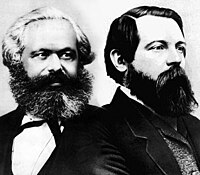
Photo from wikipedia
While Friedrich Engels’s The Condition of the English Working Class is almost universally praised as an honest, insightful and indeed profound picture of working-class life in Manchester in the 1840s,… Click to show full abstract
While Friedrich Engels’s The Condition of the English Working Class is almost universally praised as an honest, insightful and indeed profound picture of working-class life in Manchester in the 1840s, much of the rest of his contribution to Marxism has typically been dismissed as popularization that reduced Marx’s sublation of materialism and idealism to a warmed-over version of eighteenth-century materialism. What is more, it is this “Engelsian”Marxism that is said to have informed the mechanical and authoritarian interpretations of Marxist politics that became hegemonic on the twentieth-century left. Criticisms of Engels’s politics have a long pedigree. At the end of the nineteenth century, Eduard Bernstein famously argued that though Engels had in practice embraced modern, constructive, evolutionary and electoral politics he failed to theorize this break with the older destructive and insurrectionary form he and Marx had embraced in the 1840s. Bernstein imagined his own “revisionism” as an attempt to draw the logical theoretical conclusions from Engels’s mature political practice to update socialist theory to modern conditions. Though Bernstein’s critique of Marxism cannot bear critical scrutiny, something like his crude contrast between constructive and destructive or evolutionary and insurrectionary politics has tended to frame even some of the best twentieth-century academic interpretations
Journal Title: Socialism and Democracy
Year Published: 2019
Link to full text (if available)
Share on Social Media: Sign Up to like & get
recommendations!